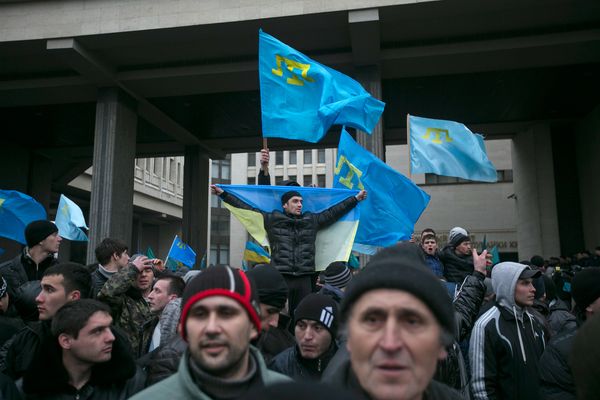
The Islamic Factor in Crimea
Publication: Eurasia Daily Monitor Volume: 11 Issue: 69
By:

Russia’s Anschluss of Crimea last month was carried out according to all the standard procedures of the Third Reich. Like Nazi Germany and the Sudetenland in 1938, Moscow captured Crimea and presented the move as a triumph of historical justice (https://www.youtube.com/watch?v=H4octWQkIxg).
There are also some important differences between what happened in Europe in 1938 and what happened in in Crimea in 2014, however. First of all, Crimea has been the native territory of the Crimean Tatars since the 13th century and had no relationship with Russia until the Russian conquest of the peninsula in the 18th century (https://www.iot-ekb.ru/krym.htm). Yet, under various pretexts, the balance between the indigenous Tatar and non-native population was changed in 1944 with the mass deportation of the Crimean Tatars for alleged collaboration with the Germans. This accusation was barely legitimate, since ethnic Russians massively collaborated with the Germans in occupied Russian territory, not to mention the nearly million-strong army of Russian General Vlasov, which was part of the German army (https://www.posev.ru/files/articles/46.htm).
Thus, Crimea became an ethnic-Russian majority territory as a result of a policy of ethnic cleansing. This is a crime that has yet to receive its own judgment by the international community. Silence on the topic and the lack of condemnation of the mass deportations of ethnic minorities in Russia in the 20th century has led to new crimes by Russia against those same ethnic minorities. The Chechens were punished in two wars that were both criminal in spirit and brutal in substance.
Having acquired Crimea, Russia has also acquired its problems. The attempt to replace the failed and hopeless project to build North Caucasian resorts with similar projects in Sochi and Crimea may end up extending the North Caucasian armed resistance to Crimea due to the lack of employment options in the region. The Crimean Tatars are not simply Muslims, but Muslims with various Islamic affiliations—Salafis, Jihadis, Sufis, Taqfirs and so on. It should be noted that the primary theoretician of pan-Turkism, Ismail Gasprinski, was born on the peninsula (https://kitaphane.crimea.ua/ru/node/149). Crimea is not simply the center of Crimean Tatar nationalism, but a longtime center of Tatar separatism, which is well rooted among the numerous diaspora in Turkey.
Prior to announcing that Crimea would become a new Russian federal district (https://www.interfax.ru/russia/366331), the Russian president should have considered which Muslim Spiritual Board this new group of Russian Muslims will be affiliated with. This is not an idle question. If the Crimean Tatars are allowed to retain their own Muslim organizational structure, it will not be a pro-Moscow one. If they are included in one of the two existing Tatar Muslim organizations, the Council of Muftis of Russia in Moscow or the Spiritual Board of Muslims of European Russia and Siberia in Ufa, that will create a conflict between the two Russian Muslims centers and the Crimean Tatars. If the Crimean Tatars remain independent of the other Russian Muslim organizations, the latter will still vie for influence over Crimea.
In other areas, the Islamic group Hizb ut-Tahrir has been fairly popular in Crimea, demonstrating the ability to bring 2,000 to 3,000 protesters into the streets (https://www.newsru.com/religy/24mar2014/abdurahimov.html). Unlike in Russia, this party was not outlawed in Ukraine and was able to spread its ideas legally in Crimea until the Russian Anschluss. Now, under Russian rule, the party finds itself in an illegal status and its several thousand members have automatically become suspected Islamists who will likely be viewed as posing a danger to Russia. The leaders of Hizb ut-Tahrir condemned the Russian invasion of the peninsula, calling it an occupation. According to the local leader of Hizb ut-Tahrir, Osman Bakhkhash, Russia has been weaving plots against Islam and Muslims for centuries (https://umma.ua/ru/news/ukraine/V_Krimu_mogut_zapretit_islamistskuyu_partiyu_Hizb_ut-Tahrir/24715). Therefore, the question of shutting down this party in Crimea is likely to arise in the near future (https://ria.ru/world/20140318/1000005703.html).
Yet another challenge for Russia is how to deal with the supporters of global jihad in Crimea. Having failed to resolve the issue of jihadists in the North Caucasus, Moscow has now acquired a new region that includes jihadis. Moscow is also acquiring a Crimean Tatar battalion that has been fighting in Syria as part of the Jaish al-Muhajireen wal-Ansar group and is one of the most combat-ready units of the mujahideen in Syria (https://topwar.ru/27339-krymskoe-eho-siriyskoy-voyny.html). Moreover, the leader of the Crimean Tatar fighters in Syria, Emir Abdulkarim Krymsky (https://shamnews.tv/archives/394), is second from the top in the foreign unit fighting in Syria under the command of Emir Salautdin (https://fisyria.com/?p=477). It is entirely possible that the fighters of the Crimean Tatar jamaat will return to the peninsula after the conflict in Syria is over. One of the best known Crimean Tatar leaders, Mustafa Cemilev, is certain about that (https://mignews.com.ua/ru/articles/157668.html).
Russia will find it hard to distinguish between the Crimean Tatars’ regional nationalism and the Islamic activism of some Crimean Tatars who are followers of various Islamic currents. Thus, there will likely be a new Islamic renaissance in Crimea. There are other outstanding issues tied to the Crimean Tatars as well. These include the Russian government’s refusal in 1994 to compensate them for losses during the deportation or to allow the remaining Crimean Tatars in Central Asia to return to the peninsula; the government’s refusal to allow Crimean Tatars to build mosques in all the areas where they reside or to restore those mosques that existed prior to the deportation; the government’s refusal to restore the old Tatar names of towns that were inhabited by Crimean Tatars prior to the deportation and renamed with Russian names; and the government’s refusal to return land that belonged to the Crimean Tatars prior to their deportation.




